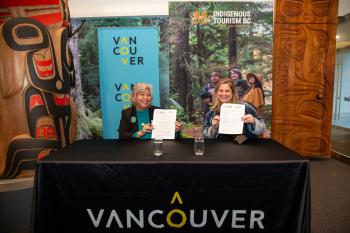Image Caption
Summary
Local Journalism Initiative Reporter
Windspeaker.com
Details about a memorandum of understanding (MOU) between Destination Vancouver and Indigenous Tourism BC (ITBC), were announced at a news conference on Monday, Dec. 13. The partners will promote Indigenous cultural tourism in Vancouver.
“We’ve been wanting to have this partnership for a long time,” said Brenda Baptiste, the board chair of Indigenous Tourism BC.
ITBC is the non-profit organization working to grow and promote a sustainable Indigenous tourism industry in the province.
Destination Vancouver is the organization that supports the city’s tourism industry, promoting the city to domestic, U.S. and international markets.
The Musqueam, Squamish and Tsleil-Waututh First Nations will also be involved in the process of telling the stories of their people and their lands.
“We want to be able to tell that story from an Indigenous perspective,” Baptiste said, adding such has not been the case at many Vancouver tourist sites in the past.
ITBC and Destination Vancouver officials were joined by Vancouver Mayor Kennedy Stewart and various city councilors at Monday’s press conference.
The event was held at the Bill Reid Gallery of the Northwest Coast Art in downtown Vancouver.
Though she was unable to attend the news conference, Melanie Mark, the minister of Tourism, Art, Culture and Sport, delivered a video message.
Mark, who is MLA for Vancouver-Mount Pleasant, is the first First Nations woman elected to the province’s legislative assembly.
Besides serving as a commitment to work together on Vancouver’s future tourism plans, the MOU is considered a step towards reconciliation by not only building trust but also by respecting protocols and the ancestral knowledge of local First Nations.
Royce Chwin, the president and CEO of Destination Vancouver, said it was essential for his organization to get on board with the new partnership.
“Destination Vancouver has a responsibility and role to play in reconciliation (and) with our First Nations partners we will build a future that fully reflects the cultures and diversity of local First Nations and educates visitors about the history of the land we welcome travelers to,” he said.
Like Baptiste, Chwin believes it’s vital for the city’s tourism efforts to include an Indigenous perspective.
“We believe that it is essential to make Indigenous voices an integral component of the work we must do to rebuild, creating a more resilient and regenerative visitor economy, anchored in a triple bottom line approach, that supports people, and the planet, while maintaining profitability for those supporting tourism in our region,” he said.
Robyn McVicker, the board chair of Destination Vancouver, also believes it’s important to better promote the city’s history.
“We are so fortunate to promote a land that is not only known as one of the most exciting, attractive and welcoming global city destinations, but also has a deep history that enriches the tourism industry,” she said. “As we continue to rebuild our tourism offering, and travel to our region continues to recover, now is the time to cultivate important relationships that promote and educate visitors about this land’s long history and founding cultures.”
Though an MOU has now been signed, Baptiste said there is still plenty of work ahead.
“The next step is working with Destination Vancouver to start building a strategy in how we can start making changes,” she said.
Some of those changes are expected to take some time to implement.
“It’s a long-term strategy but definitely there are short-term goals as well,” Baptiste said. “As Indigenous people we tend to think in generations. We’ve got a long-term vision of the work we have to do.”
Baptiste said Vancouver residents and domestic visitors are indeed among those who could be better informed of the Indigenous history at various tourist locations throughout the city.
She also said the pandemic has forced ITBC reps to focus more on provincial travelers, primarily because of restrictions in place for international visitors and those from the U.S.
“COVID provided us with an opportunity to think more about B.C. residents,” Baptiste said.
Local Journalism Initiative Reporters are supported by a financial contribution made by the Government of Canada.

